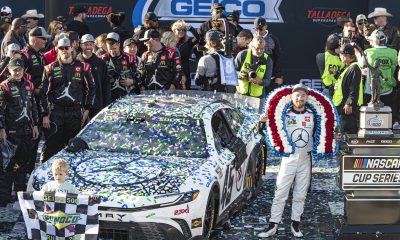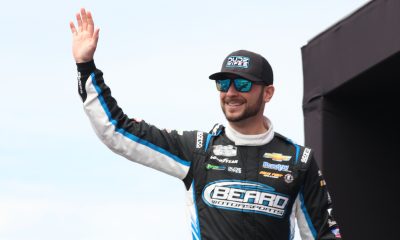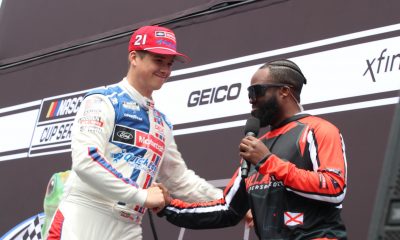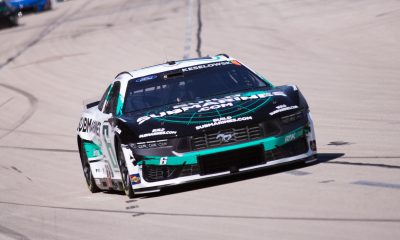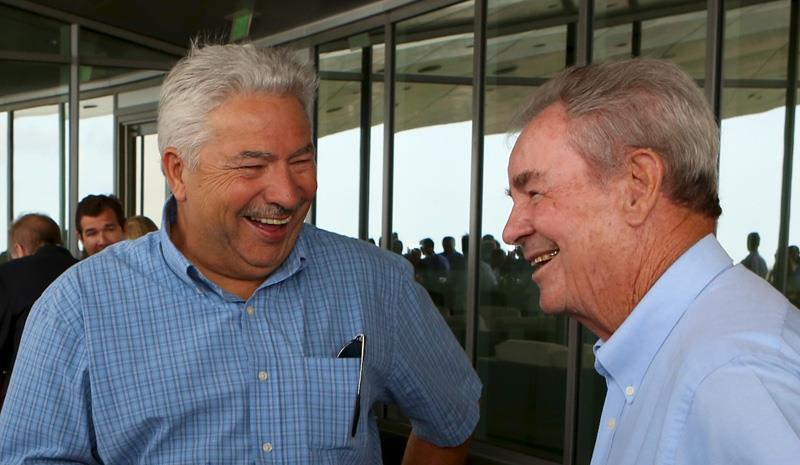
As the year 2018 concludes, Joe Moore’s colleagues share great memories of this NASCAR personality.
Most dictionaries define the word “legend” as an extremely famous or notorious person, especially in a particular field.
When it comes to NASCAR radio, Joe Moore certainly fits that definition. As some of his closest friends and colleagues share in this two-part series, we’ll look into what made Joe Moore a truly special NASCAR personality.
For Joe Moore, 2018 was the end of a radio career that dated back to days in Vietnam on the American Forces Thailand Network while in the Army spinning vinyl in Smithfield and Norfolk, VA. These times of local radio led to an opportunity to join the announcing crew at Richmond International Raceway.
That stop at Richmond led Joe Moore towards his path as a legendary voice that NASCAR fans have known and loved for over three decades.
Joe made the call to Mike Joy, who was running the Motor Racing Network, anchoring the race broadcasts in 1977, leading to his audition and eventual first call at the Daytona 500.
Mike Joy
Joy reflected on his very cordial relationship with Moore that overlapped with their time at MRN. However, when it came to describing Moore as a person, Joy quipped, “He had a quick about him. Something I think all radio personalities have.”
Not too coincidental, Joy and Moore worked with Barney Hall, a radio telecaster often dubbed as “The Voice of NASCAR.” As such, Joy said that with all of the years Moore worked with Hall in the booth, Moore possesses Hall’s qualities and his presentation of a race.
“Barney was a wonderful storyteller,” Joy reflected. “He was also a great play-by-play guy, and often you could read between the lines of what Barney wasn’t saying, and often glean an awful lot of the rest of the story. Joe had that same ability, and it was something that made him very successful.”
Joy has enjoyed a successful career of his own and he knows what distinguishes remarkable radio and TV personalities.
“Everyone of us has a catch phrase,” Joy said. “Something we go to when developing our next thought. Barney used ‘this afternoon,’ ‘an example as,’ ‘so and so has led a lot of laps here this afternoon.'”
Notably, Joy observed how Moore would do this often.
“I don’t know if that’s something Joe did consciously,” Joy mused. “I don’t think so. But, over time, that became his catch phrase. Which is really kind of sweet because every time I hear that, I think of Barney, who was one of my best friends in this business.”
Not only did fans hear Joe Moore during the broadcast, but also on the scanners during commercial breaks, and that quick wit that Joy described was heard as well.
“Joe was the guy that would quickly fire back with a one liner or a quick response that would get a laugh and attention,” Joy remarked. “This was something that anyone that knew Joe, worked with or was friends with said. He has a sense of humor and no one was immune to it.”
From Mike Joy, Alex Hayden, Joe’s wife Tiffany, and even his former boss David Hyatt, Moore’s closest associates observed his balance between professionalism and enjoyment. Ultimately, Moore knew the fine line between calmness and intensity.
Alex Hayden
Alex Hayden worked with Joe Moore for 21 years at MRN and knows where the line was.
“Joe always wanted to have fun,” Hayden commented. “But, don’t get me wrong – you can’t mistake having fun with not being serious. Joe was totally serious and he was totally committed to having a great broadcast. But part of his formula to have a great broadcast was to have fun because if, if we as announcers are having fun delivering what we’re doing, then the listener is going to be more relaxed and more apt to have fun along with us.”
From day one, Alex said he saw both sides of Joe.
“He could have fun, but he knew how to get the job done, and he also knew how to he was very encouraging and had nothing but good things to say,” Hayden shared. “Joe knew the emotions we were going through. He wasn’t like some of the others that would occasionally mess with the new guys.”
Remarkably, Moore knew how to lighten the mood and make the new guys comfortable. Hayden recalled his first race on-air, which was a Busch Series race at Rockingham.
“I was on the backstretch and turns three and four,” Hayden recounted. “Joe was in front of me in turns one and two. Before the race started, I’ll never forget Joe walked out to me and said to just have fun. But, in his hands Joe had a pair of shorts and sunscreen.”
Upon reflection, Hayden recalled a moment when Moore went to the suites at Rockingham with a casual approach.
“He was heading up there to take his pants off and put shorts on, put some sunscreen on, sit back in his folding chair and catch some sun while calling the race,” Hayden said. “That pretty much set up my relationship with Joe Moore.”
Certainly, in Hayden’s perspective, Moore was a leader, but not in the sense that most of us think.
“We just simply leaned on Joe because of that humor,” he said. “Because of that lightheartedness, he made things easier, especially after the consummate Professional, Barney Hall’s final sign-off and eventual passing. Joe took the baton and led the band, so to speak.”
Hayden justified Moore’s appeal with his colleagues at the track as he lightened the mood.
“He was a great storyteller,” Hayden stated. “Plus even though it kinda brought back some great memories and some sad times because you missed Barney. Joe had a way of making you smile and making you laugh. So it wasn’t necessarily that we went to Joe as much as it was. We just wanted to be around Joe
This was just one of the great stories about Joe and everyone that knows him has one. Those stories even include his former boss at MRN,
David Hyatt
While he now runs Iowa Speedway, David Hyatt reminisced on his time working with Joe Moore.
Hyatt described meeting Moore for the very first time in the early 80’s when he was auditioning with MRN.
“I was living in Bristol at the time and went out to learn about the network during the Bristol race weekend,” Hyatt illustrated. “When I first met Joe, I remember knowing his voice from hearing him, but I thought he looked like Bob Villa from “This Old House.”
Hyatt recalled how Moore sported a beard and darker hair at the time versus his grey hair of today.
“I thought, man, you don’t sound like Bob Villa, because that’s what I’m expecting to come out of your voice right now,” Hyatt recalled.
Above all, Hyatt said he formed a friendship with Moore that day.
“Joe Moore was quite possibly one of the most, if not the most optimistic people I’ve ever met in my life,” Hyatt said. He added, “We hit it off pretty quickly and he became not only a great, great friend, but a long term co-worker, and even a mentor to me throughout my career.”
Relationship With The Boss
Many times, the relationship between a “boss” and his employees is the difficult task of communication and levels of respect. How does one get along with the other?
David Hyatt describes Joe Moore as a friend and colleague.
“I wasn’t big on saying employee,” Hyatt said. “One of the coolest things about working with Joe was, if you had a conflict or an issue, he understood it. You could talk it out with Joe. He knew how to stand his ground, if you will, when he stood on principle and needed to get something accomplished. But it was always a very easy conversation. Even the hard conversations were easy conversations to have because more often than not, Joe understood it.”
This sentiment was very common when talking with Moore’s friends and colleagues – that he was easy to work with.
Above all, Moore was very helpful to young announcers. As Hyatt explained, Moore was as good of a mentor as he was a talent himself.
“Joe was a constant cheerleader,” Hyatt shared. “He was a guy that you think about with how small the pool of broadcasters in this industry. Joe was never the guy that felt like his job was being threatened by someone new. He was accepting of new people coming in to the sport. Joe always had the positive attitude and willingness to help.”
Watching and Audition
The two young announcers went out to the turn with Moore, who had a full set of broadcast gear. Then, they went to a single set for the two to swap back and forth.
Hyatt said neither of them could hear the other during their calls of a few laps. Interestingly, he said each time the second guy was auditioning, Moore would give him a look like “it’s alright.”
Naturally, Moore knew that Hyatt was nervous and that was a little reassurance. After several rotations, Moore kept telling him, “It’s all good, you’re fine.”
When the audition wrapped up, Hyatt said that while both were nervous, they got a private critique and their tape. That’s when Hyatt understood why Moore eased him on his concerns.
“The other guy would mess up, stop and tell John (McMullin, MRN president), ‘Let me start over,'” Hyatt recalled.
“Joe was encouraging me knowing that I couldn’t hear what was going on. He knew I had nothing to be concerned about. And it turned out to be true.”
Ultimately, Moore had an impact on every person’s life that he encountered. Suffice to say, Hyatt made the decision to move Moore from the turns to the broadcast booth. After that move, Moore helped encourage and bring great broadcasters in to the field.
Musing Minds
While talking with some of Moore’s friends and colleagues, I asked what they would write as a foreword for a book. If Moore asked them to write it, but keep it short, how would it go. As you can imagine, this was tough.
Alex Hayden: It would be difficult to put into a short paragraph just what he’s meant to MRN, NASCAR, and radio in general. For somebody who’s seen and done so many different things, from being in Vietnam to broadcasting to the troops, he was a radio broadcaster. He came back and ran radio stations and elevated the local radio scene in southeastern Virginia to being 35 years with the Motor Racing Network.
Joe was one of the key voices that that brought racing into the homes, cars, and garages around the world. Joe Moore, I think when you have to sum it up, was a guy who was the consummate professional, but always did it with a smile. When the mics were turned off, he did it with some jokes. He was one of the guys that everybody wanted to be around all the time, no matter what the scenario was. Joe Moore was the kind of guy we all would love to be.
Mike Joy: Joe Moore was an unassuming broadcaster from coastal Virginia who took the sport he loved and made it larger than life for listeners around the world. There was an influence from Barney Hall. He became famous by not doing anything to make himself famous.
I mean, we’ve had a lot of people in this business and the one thing they seem to say with clarity is their own name. Barney never said his name on the air and Joe rarely did, unless it was a complete reset. It wasn’t about him. It didn’t have to be, but it sure worked out well for him.
David Hyatt: Joe Moore is by nature, a cheerleader, a mentor, a teacher, and a professional. And he’s able to wrap all of that into what has become an enviable career for anyone who would want to be in the motorsports broadcast industry.
Next Time By…
We want to congratulate Alex Hayden as he will join Jeff Streigle and Rusty Wallace in the MRN booth in 2019. We know you’ll bring the same class and professionalism that Joe and those before you brought to the broadcast.
In the concluding part of this tribute, NASCAR Hall of Fame Executive Director and MRN pit reporter Winston Kelley, lead turn announcer Dave Moody, and Tiffany Moore, Joe’s wife, will share their thoughts and memories of this remarkable NASCAR personality.
If it races, I'll write about it, talk about it or shoot it with a camera. I began pursuing a career in motorsports journalism immediately after attending college at Kent State University. I have hosted multiple Motorsports talk shows, worked in Country Music radio, and now i spend every day on the air in the morning with 1300 and 100.9 WMVO and in the afternoons watching the roadways around Central Ohio for 93.7 WQIO. The excitement and the fans make everything I put out there worth while, it's been an exciting 15 years having covered everything from the Daytona 500 to the Rolex 24 and you can find me at pretty much any event run at Mid-Ohio Sports Car Course. What I like to bring is a look behind the scenes, a look at what and who makes the sport grow. From the guy that welds pieces back at the shop to the host in the tv booth. Everyone has a story and I like to tell it. My main focus here at TPF is looking at the men and women behind the microphone and cameras. My life long goal is to become a member of MRN or PRN Radio and bring the races to you. I hope that what I share now is enjoyable and gives you a unique look in to the world of motorsports. See you at a track soon

